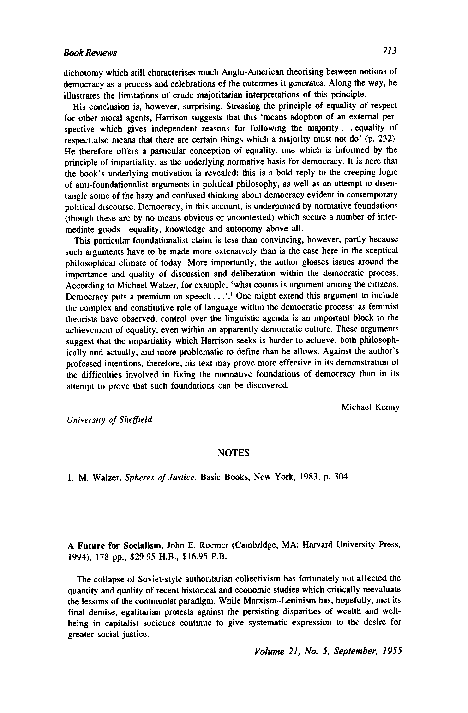Academia.edu no longer supports Internet Explorer.
To browse Academia.edu and the wider internet faster and more securely, please take a few seconds to upgrade your browser.
A future for socialism
A future for socialism
A future for socialism
Related Papers
2016 •
Simon Griffiths and Kevin Hickson (eds.), British Party Politics and Ideology after New Labour
New Labour, New Liberalism and Revisionism's Second Wave2010 •
In M. Freeden, L. Tower Sargent and M. Stears (eds.), The Oxford Handbook of Political Ideologies (Oxford University Press, 2013), pp. 348-63
Social DemocracySocial Democracy, a contemporary outlook
Social Democracy, from Berstein to the Post-Modern Challenge2022 •
This essay analyses Eduard Bernstein’s thought and the origin of social democracy while taking notice of the ideological divisions within the socialist movement. Furthermore, it sheds light upon the principles of social democracy and the Darwinian influences on Bernstein’s thought. This essay also makes a distinction between the traditional social democracy and its modernization and rebranding that took place in the 90’s by Tony Blair in the UK and Bill Clinton in the US, the third way. It alerts to the current challenges that social democracy is faced with nowadays and the risk of a definite ‘PASOKification’. To sum up, this essay makes clear what the importance of remembering Bernstein’s thought is and what it can teach to the modern version of his creation, social democracy. Keywords: Social Democracy; Socialism; Bernstein; Evolution; Third Way; PASOKification
2020 •
The article aims to present the normative premises of a Marxist theory of justice and to argue that such an endeavor has, at its central pillar, the value of self-ownership. The article first undertakes a summary of the main strands in the literature on exploitation. It divides the literature into force-based and distributional-based conceptions of exploitation. Then, the article uses these insights in order to illuminate the Marxist texts and to argue in favor of a limited form of self-ownership combined with joint ownership of global resources and the absence of alienation as the main building blocks of a Marxist theory of justice. Finally, the article defends the idea of limited self-ownership as both internally coherent as a better approximation of Karl Marx’s works than the principle of need. While the full development of a Marxist theory of justice is left for a further work, the paper contributes an interpretation of the building blocks of such a theory.
Cambridge Journal of Economics
New market socialism: a case for rejuvenation or inspired alchemy?2003 •
Journal of the History of Ideas Blog
"We'll Need More Than Rawlsianism Can Offer": Katrina Forrester on John Rawls and Anglo-American Political Philosophy after 19452019 •
Politics, Philosophy and Economics
Our Unfinished Debate about Market Socialism2014 •
This article reconstructs and reflects on the 1989 debate between Jerry Cohen and myself on market socialism in the light of Cohen’s ongoing defence of communitarian socialism. It presents Cohen’s view of market socialism as ethically deficient but a modest improvement on capitalism, and outlines some market socialist proposals from the 1980s. Our debate centred on the issues of distributive justice and community. I had argued that a market economy might be justified by appeal to desert based on productive contribution, but Cohen saw effort as the only relevant desert base, and claimed that only non-comparative judgements of economic desert were possible. Market-derived inequalities, therefore, could not be deserved. He also condemned markets for relying on the motives of greed and fear, and therefore as destructive of community. In reply, I asserted that markets also liberated people from fixed social roles, and that market competition could be viewed differently, as providing the most effective way for people to contribute to each other’s welfare. In retrospect, this debate can be seen to raise questions about the nature of justice and the purpose of political philosophy that have come to the fore in recent exchanges between ‘realists’ and ‘idealists’.
Historical Materialism, Vol. 22, Issue 1, 34-66.
1996 •
On 4 August 1914 the socialist parties of Germany and France, in Parliament solemnly assembled, voted war credits to their governments and pledged support to their governments for the duration of the war that was already upon them. Throughout Europe there was grim foreboding that things would never again be the same, but for Lenin the events of 4 August were a cataclysm that turned his world upside down. It was out of this trauma that Leninism, as an integrated ideology of global revolution, was rapidly to emerge. Within three years he had outlined a global economic analysis, a historiography, philosophy and politics, woven into a cohesive and militant ideology. It was expressly presented not merely as an alternative to all existing ideologies, bourgeois and socialist, but as the ideology of a new world and a new time that would sweep them all away. It was, if anything, more bitter in its denunciation of rival socialist and Marxist schemes of thought than it was of liberalism or con...
RELATED PAPERS
International Journal of Political Economy
Social Dividend Versus Basic Income Guarantee in Market SocialismHistory of Political Thought
Social Democracy and 'positive' foreign policy: The evolution of Eduard Bernstein's international thought, 1914-19202021 •
2022 •
Annals of the Fondazione Luigi Einaudi
From the “Social Democratic Moment” to the “Shock of the Global”. The British Labour and the German Social Democracy during the 1960s-1970s2018 •
Journal of Political Ideologies
'Comrade Hayek'or the revival of liberalism? Andrew Gamble's engagement with the work of Friedrich Hayek2009 •
The European Legacy
Thinking like a radical: Social Democracy, moderation, and anti-radicalism2023 •
Socialist Register
Rethinking class: The lineage of the Socialist Register2014 •
2003 •
2020 •
2012 •
IOSR Journal of Humanities and Social Science
Reform Communism and Neo-Marxism in West Bengal: A Theoretical-Explorative Design2013 •
2021 •
Journal of Libertarian Studies
How and Why Fascism and Nazism Became the "Right"2021 •

 Manfred Steger
Manfred Steger